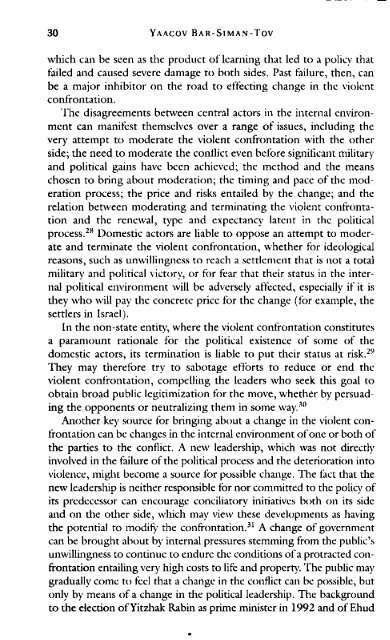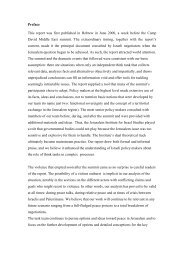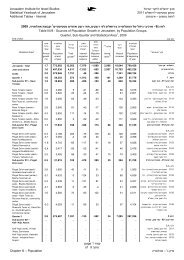Download full text - The Jerusalem Institute for Israel Studies
Download full text - The Jerusalem Institute for Israel Studies
Download full text - The Jerusalem Institute for Israel Studies
Create successful ePaper yourself
Turn your PDF publications into a flip-book with our unique Google optimized e-Paper software.
30<br />
YAACOV BAR-SIMAN-TOV<br />
which can be seen as the product of learning that led to a policy that<br />
failed and caused severe damage to both sides. Past failure, then, can<br />
be a major inhibitor on the road to effecting change in the violent<br />
confrontation.<br />
<strong>The</strong> disagreements between central actors in the internal environment<br />
can manifest themselves over a range of issues, including the<br />
very attempt to moderate the violent confrontation with the other<br />
side; the need to moderate the conflict even be<strong>for</strong>e significant military<br />
and political gains have been achieved; the method and the means<br />
chosen to bring about moderation; the timing and pace of the moderation<br />
process; the price and risks entailed by the change; and the<br />
relation between moderating and terminating the violent confrontation<br />
and the renewal, type and expectancy latent in the political<br />
process. Domestic actors are liable to oppose an attempt to moderate<br />
and terminate the violent confrontation, whether <strong>for</strong> ideological<br />
28<br />
reasons, such as unwillingness to reach a settlement that is not a total<br />
military and political victory, or <strong>for</strong> fear that their status in the internal<br />
political environment will be adversely affected, especially if it is<br />
they who will pay the concrete price <strong>for</strong> the change (<strong>for</strong> example, the<br />
setders in <strong>Israel</strong>).<br />
In the non-state entity, where the violent confrontation constitutes<br />
a paramount rationale <strong>for</strong> the political existence of some of the<br />
domestic actors, its termination is liable to put their status at risk. 29<br />
<strong>The</strong>y may there<strong>for</strong>e try to sabotage ef<strong>for</strong>ts to reduce or end the<br />
violent confrontation, compelling the leaders who seek this goal to<br />
obtain broad public legitimization <strong>for</strong> the move, whether by persuading<br />
the opponents or neutralizing them in some way. 30<br />
Another key source <strong>for</strong> bringing about a change in the violent confrontation<br />
can be changes in the internal environment of one or both of<br />
the parties to the conflict. A new leadership, which was not direcdy<br />
involved in the failure of the political process and the deterioration into<br />
violence, might become a source <strong>for</strong> possible change. <strong>The</strong> fact that the<br />
new leadership is neither responsible <strong>for</strong> nor committed to the policy of<br />
its predecessor can encourage conciliatory initiatives both on its side<br />
and on the other side, which may view these developments as having<br />
the potential to modify the confrontation. A change of government<br />
31<br />
can be brought about by internal pressures stemming from the public's<br />
unwillingness to continue to endure the conditions of a protracted confrontation<br />
entailing very high costs to life and property. <strong>The</strong> public may<br />
gradually come to feel that a change in the conflict can be possible, but<br />
only by means of a change in the political leadership. <strong>The</strong> background<br />
to the election of Yitzhak Rabin as prime minister in 1992 and of Ehud












